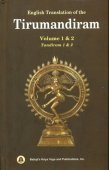Gnosis: 3 definitions
Introduction:
Gnosis means something in Buddhism, Pali, Hinduism, Sanskrit. If you want to know the exact meaning, history, etymology or English translation of this term then check out the descriptions on this page. Add your comment or reference to a book if you want to contribute to this summary article.
In Hinduism
Vedanta (school of philosophy)
Source: ORA: Amanaska (king of all yogas): (Advaita Vedanta)Gnosis is denoted by the Sanskrit term Jñāna, according to the Māṇḍūkyopaniṣatkārikā 3.35cd-36.—Accordingly, while discussing Brahma (without attributes): “That very [mind, free of thought and restrained,] is fearless Brahma, [which is] the light of gnosis (jñāna-āloka) [pervading] everywhere. [It is] unborn, devoid of sleep and dreaming, unnamed, formless, manifested [all] at once and omniscient. [This statement] is not figurative in any way”.

Vedanta (वेदान्त, vedānta) refers to a school of orthodox Hindu philosophy (astika), drawing its subject-matter from the Upanishads. There are a number of sub-schools of Vedanta, however all of them expound on the basic teaching of the ultimate reality (brahman) and liberation (moksha) of the individual soul (atman).
Yoga (school of philosophy)
Source: ORA: Amanaska (king of all yogas): A Critical Edition and Annotated Translation by Jason BirchGnosis is denoted by the Sanskrit term Jñāna, according to the Śivayogadīpikā by Sadāśivayogīśvara: a text dealing with Śaivism and Haṭhayoga in two hundred and eighty-nine verses.—Accordingly, while discussing the difference between Rājayoga and Śaivayoga: “[...] Devotion is gnosis (jñāna) full of Śiva, and Śaiva gnosis (jñāna) is Śiva’s nature. Since Śaiva observance is worship of Śiva, Śiva's yoga is five-fold. He who is without the practice [of worshipping] Śiva is certainly a bound soul, and he goes round and round forever in this cycle of birth and death”.

Yoga is originally considered a branch of Hindu philosophy (astika), but both ancient and modern Yoga combine the physical, mental and spiritual. Yoga teaches various physical techniques also known as āsanas (postures), used for various purposes (eg., meditation, contemplation, relaxation).
In Buddhism
Theravada (major branch of Buddhism)
Source: Pali Kanon: Manual of Buddhist Terms and Doctriness. indriya (21).
Theravāda is a major branch of Buddhism having the the Pali canon (tipitaka) as their canonical literature, which includes the vinaya-pitaka (monastic rules), the sutta-pitaka (Buddhist sermons) and the abhidhamma-pitaka (philosophy and psychology).
See also (Relevant definitions)
Full-text (+214): Shivamaya, Jnanasattva, Sambhogakaya, Nirmanakaya, Advayajnana, Sahajakaya, Dharmakaya, Vijja, Ananda, Jnana, Viramananda, Paramananda, Sahajananda, Jnanabhakti, Krityanushthanajnana, Pratyavekshanajnana, Shaivajnana, Samatajnana, Pratyavekshana, Adarshajnana.
Relevant text
Search found 16 books and stories containing Gnosis; (plurals include: Gnosises). You can also click to the full overview containing English textual excerpts. Below are direct links for the most relevant articles:
Ontological Bases of a Literary Work of Art -An Indian View
Reviews < [July 1963]
Reviews < [October 1963]
Verses on the Perfection of Wisdom
Vimalakirti Nirdesa Sutra (by Robert A. F. Thurman)
Chapter 11 - Lesson of the Destructible and the Indestructible
Chapter 1 - Purification of the Buddha-Field
Maha Prajnaparamita Sastra (by Gelongma Karma Migme Chödrön)
Appendix 3 - Legend of the bodhisattva Sadāprarudita < [Chapter XXXVI - The eight recollections (anusmṛti or anussati)]
Note (2). The ten Bodhisattva grounds or abodes < [Chapter XX - (2nd series): Setting out on the Mahāyāna]
Buddhas of the present: Preliminary note (4) < [Part 7 - Seeing, hearing and understanding all the Buddhas of the present]
Saying 39 - Pharisees And Scribes Impede Acquaintance
Saying 41 - The Person Who Has Will Receive
The Dawn of the Dhamma (by Sucitto Bhikkhu)
Related products

